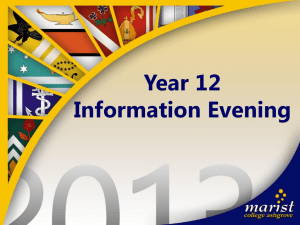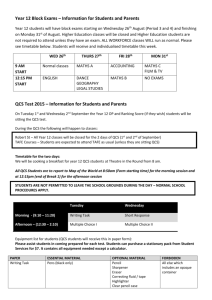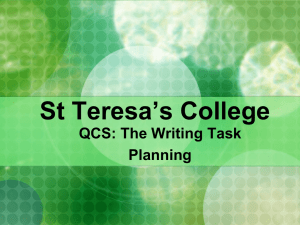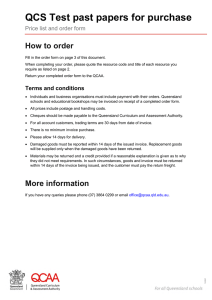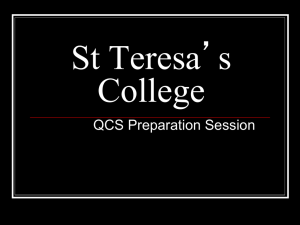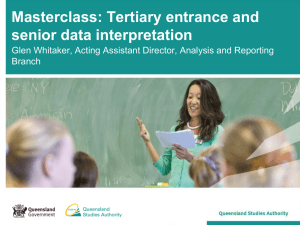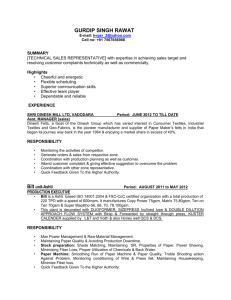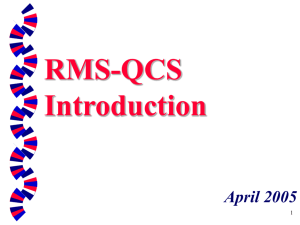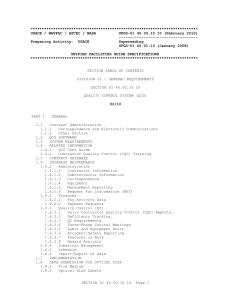Year 11 Parent Information Evening
advertisement
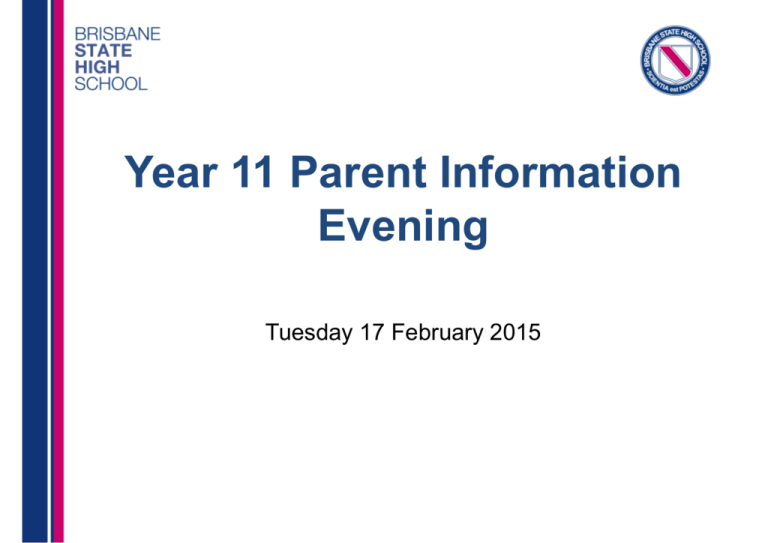
Year 11 Parent Information Evening Tuesday 17 February 2015 Tonight’s Program • Executive Principal’s Address • What is a QCE? • Certificate II Active Volunteering • What is an OP? • What is QCS? • How does State High support students in the senior years? Executive Principal Wade Haynes Our team Dean of Students Troy McMahon Head of Senior School Matthew McCarthy Deputy Principal Janice Head Head of Year 11 Anna Dollman Guidance Officers Nicole Collins Michael Graves Head of Year 10 Liz Lacey Head of Year 12 Elise Jacoby Executive Principal Mr Wade Haynes Strong Performance Culture • All students complete Year 12 with a meaningful pathway • QCE, VET, meaningful OP • Growth mindset • 99% QCE • >100 VET qualifications • 94% OP1-15 Strong Performance Culture OP1 35, 83 with bonuses OP1-5 185, 47% OP1-10 300, 76% The story of each student… Senior Schooling • Lots of new words and acronyms! – OP, QCE, QCS, VET, Selection ranks, Bonus ranks, SAI, LOA, summative / formative, QTAC, UMAT, ATAR Senior Education Profile Achievement Qualification Tertiary entrance (Position) Queensland Certificate of Education • A minimum of 12 credits from core at Sound Achievement (SA) or better • 8 credits from core, preparatory, enrichment or advanced at SA or better • 3 subjects of learning over 4 semesters • MUST have at least one semester of literacy and numeracy at SA Literacy and Numeracy Requirement • Students not meeting the literacy or numeracy requirement by the end of Year 12 will not get a QCE, regardless of overall points. Pathways at Brisbane State High ALL STUDENTS GET A QCE Pathways: 1. OP Sit QCS + 5 Authority subjects Can include a VET 2. Selection Rank QTAC Selection Rank Recommended – VET Additional learning options: VET – school-based or external Certificate III, IV or Diploma School-based Apprenticeships & Traineeships Language of Senior Schooling • 2 types of subjects – Authority (OP) – Authority registered • Students seeking an OP must: – Have a minimum of 20 semester units (5 Authority subjects x 4 semesters) – 3 of these Authority subjects must be studied continuously through Y11 & Y12 – Sit the Queensland Core Skills Test (QCS) Assessment • 2 types of assessment – Formative: used to map/monitor learning progress during a unit of work. Formative assessment provides ongoing feedback to teachers and students. The assessment provides information on progress, and identifies and addresses areas that require further development. – Summative: generally completed at the end of a unit of work to document the level of achievement. • MYTH = Year 11 doesn’t count! What is an OP and how are they calculated? • OP = Overall Position • Represents a student's relative position in a statewide rank order based on their overall achievement in QSAapproved subjects. • Indicates how well a student has done in comparison to all other OP-eligible students in Queensland and is used for tertiary entrance purposes only. • Students are placed in one of 25 OP bands from OP1 (highest) to OP25 (lowest). • Each student is rated within a band in each subject – – – – – Very High Achievement (VHA) High Achievement (HA) Sound Achievement (SA) Limited Achievement (LA) Very Limited Achievement (VLA) • Students within a band are separated on 10 rungs. • This represents a rank order for this subject. • Each student assigned an SAI (subject achievement indicator). • Score between 400 and 200. • SAIs show individual achievement compared with the achievement of other students in each subject. 400 200 Scaling Achievement – Stage 1 Subject 1 Subject 2 Subject 3 Subject 4 Subject 5 QCS Subject Results Applied Subject 6 Scaling Achievement – Stage 1 Whole of BSHS ladder Scaling Achievement – Stage 2 School 1 School 2 School 3 School 4 QCS School Results Applied School 5 School 6 Scaling Achievement – Stage 2 • Cut-off applied • OP Awarded Whole of Queensland ladder Same Results / Different OP? • Some students may be ranked very highly within their VHA band in every subject, while others may be at the fringe. • QCS test performance can vary from year to year. • Subject group performance on QCS test can vary from year to year. Field Positions • FPs show a student’s rank order position on a scale of 1 to 10 based on achievement in up to 5 fields. These fields identify areas of study that emphasise particular knowledge and skills. • FPs are determined only for OP eligible students. • Used in high demand courses as marginal cut-offs. Field Positions • The five fields are: – FIELD A – extended written expression – FIELD B – short written communication – FIELD C – basic numeracy – FIELD D – solving complex mathematical problems – FIELD E – substantial practical performance OP Myths OP Myths • Myth 1: Students with 5 or more VHAs and an ‘A’ on the QCS Test automatically get an OP1. • Myth 2: Students with 5 SAIs of 400 will get an OP1; • Myth 3: To get an OP1, it's better to study certain subjects than others. • Myth 4: High achievers in a low-achieving group can't get a good OP. How are Provisional Results Determined? • Uses student achievement at end of Year 11 (two semesters completed). • Uses scaling factors from last five years (average). • Uses cut-off parameters from last five years (average). Provisional Results Release 1. Bubble chart Provisional Results Release 1. Score Summary Ms Anna Dollman Head of Year 11 What is the QCS Test? • • • • Queensland Core Skills Test Tests 49 Common Curriculum Elements Four papers over two days More detailed information QCS website: https://www.qcaa.qld.edu.au/587.html What is the QCS Test? • Four papers over two days What is tested? (Alpha) Comprehend and collect (Beta) Structure and sequence 1. Recognising letters, words and other symbols 21. Structuring/organising extended written text 2. Finding material in an indexed collection 22. Structuring/organising a mathematical argument 3. Recalling/remembering 29. Comparing, contrasting (Theta) Analyse, assess and conclude 32. Reaching a conclusion which is necessarily true provided a given set of assumptions is true (Deducing) 33. Reaching a conclusion which is consistent with a given set of assumptions (Inferring) 34. Inserting an intermediate between members of a series (Pi) Create and present 9. Using correct spelling, punctuation, grammar 16. Calculating with or without calculators 10. Using vocabulary appropriate to a context 17. Estimating numerical magnitude 11. Summarising/condensing written text 14. Compiling results in a tabular form 18. Approximating a numerical value 4. Interpreting the meaning of 30. Classifying words and other symbols 35. Extrapolating 5. Interpreting the meaning of 31. Interrelating pictures / illustrations ideas/themes/issues 41. Hypothesising 15. Graphing 42. Criticising 20. Setting out/presenting/arranging/displa ying 6. Interpreting the meaning of tables or diagrams or maps or graphs 7. Translating from one form to another 12. Compiling lists/statistics 38. Generalising from information 49. Perceiving patterns 43. Analysing 26. Explaining to others 44. Synthesising 13. Recording/noting data 50. Visualising 45. Judging/evaluating 27. Expounding a viewpoint 46. Creating/composing/devising 60. Sketching/drawing 28. Empathising 51. Identifying shapes in two and three dimensions 52. Searching and locating items/information 53. Observing systematically 55. Gesturing 57. Manipulating/operating/using 36. Applying strategies to trial and test ideas and procedures 48. Justifying (Phi) Apply techniques and procedure 19. Substituting in formulae 37. Applying a progression of steps to achieve the required answer QCS Support Program • QCS Practice (Y11 & Y12) – Personalised feedback – Whole school feedback used to guide preparation program • Provisional OP data – Issued after each semester – Assists students in understanding achievement and monitoring performance goals • ARC Program – – – – – – Elevate Education Goal setting Effective study routines Maximising performance Balanced life Resilience and persistence Certificate II in Active Volunteering • Service to the community • Certificate II in Active Volunteering • Theory Component – completed during class time • Practical Component – 30 hours of volunteering Mandatory part of Year 11 curriculum Vocational Education and Training (VET) • Certificate I, Certificate II, Certificate III, Certificate IV. • School based traineeships – working one day per week plus theory component. • School based apprenticeships – working one day per week which rolls over to full-time after Year 12. • Students interested in exploring VET pathways should meet with Mrs Read-Marczak (VET Coordinator) or Mrs Furlong. • http://www.apprenticeshipsinfo.qld.gov.au/schoolbased/ Guidance Officer – Senior School Nicole Collins We want students to be curious and ask questions of the sources of material around them • Beyond State High material on State High website • http://brisbaneshs.eq.edu.au/beyond-state-high • http://brisbaneshs.eq.edu.au/careers-newsletter • Lunchbox Session – During lunchtimes Terms 2 and 3 • External Education Providers and Past Students • Online material • www.myfuture.edu.au • (search for - Next Life Finder) • http://www.successfulunistudent.com.au/ • Career Expos • Career & Employment Expo (29-30 May 2015) • TSXPO (18-19 July 2015) All Year 12 students have an interview with one of the Guidance Officers to discuss the student’s plans for their time Beyond State High. - What are they going to do next? - Do they know how to enrol/engage? Further Enhancement • UQ Enhanced Studies Program • www.uq.edu.au/esp • QUT START Program • www.qut.edu.au/study/high-school-programs/start-qut • Griffith GUEST Program • www.griffith.edu.au/admissions/guests-program • What do these programs offer? During this phase students need to continue to engage with material that is available to ensure they are ready for the next step in 2017. CHECK EMAILS and respond as required. Stay connected with Student Learning Account – monitor learning that is banked – Student responsible for this. https://studentconnect.qcaa.qld.edu.au If Year 12 students wish to sit the UMAT (Undergraduate Medicine and Health Sciences Admissions Test) they register through http://www.acer.edu.au/ before 5 June 2015 and let the Senior School Guidance Officer know of their interest. http://www.studyskillshandbook.com.au Students to ask class teachers for username and password Faculty Tutorials Mathematics: • Time: 8am to 8.45am in C210 • Wednesday: 10PMA, Year 11/12 Maths A & PVM • Thursday: 10PMB, Year 11/12 Maths B & Maths C English: • Year 10 - 12 English: Tuesday morning from 8.00 – 8.45 am in A217; Thursday 3pm – 4pm in A217 Science: • Year 10 - 12 Science: Thursday Morning from 8.15 – 8.45am in E106 Student Support Services • Guidance Officers – Nicole Collins (Senior School) – Michael Graves (Junior School) • SBYHN (Nurse – Mental Health) - Kim McKernan • SBPO - Snr Constable Jodie McDonald • Chaplains - Andrew Foley & Rachael Brown Our Partnership Supporting Your Learner • Awareness. • Use assessment and course planners. • Look for ways to make your learner’s life easier during peak times • Negotiate a responsible social schedule • Encourage goal setting and evaluate progress regularly. • Acknowledge difficult times and encourage students to work support. Remind them they can work through difficult times. This builds self efficacy and resilience. • ME time - Exercise, Nutrition and Sleep Thank You and Good Night

